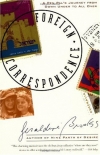Foreign Correspondence: A Pen Pal's Journey by Geraldine Brooks (finding audrey .TXT) 📗

- Author: Geraldine Brooks
Book online «Foreign Correspondence: A Pen Pal's Journey by Geraldine Brooks (finding audrey .TXT) 📗». Author Geraldine Brooks
“Will you cook them?” I asked Janine, thinking they would provide poor fare for three hungry boys. Janine shuddered. “No, I have nothing to do with this … this … hobby … of his. I hate killing. Juan loves to hunt, but I make him give away what he kills.” In return, sometimes, people brought her samples of what they made from her husband’s trophies. She went to the kitchen and returned with some home-canned pâté, made by a neighbor after Juan had a good day in pursuit of grebes. It was, I had to acknowledge, averting my eyes from the corpses of their relatives, delicious.
From September through January, Juan scheduled his building projects to allow maximum time for la chasse through the piny woods of the Lubéron. When he was home, he cleaned guns, listened to an electronic bird-call imitator that helped him identify quarry or tended his hunting dogs. He asked if I wanted to see his kennels.
We scrambled together up the steep slope behind the house. Behind a high wire fence, more than a dozen tails wagged. The dogs were kept four to a pen, and inside each pen was a doggy-sized villa, complete with stucco walls and traditional Provençal red roof tiles. Juan went from pen to pen, speaking to each dog and doling out dinner—a mixture of kibble, yesterday’s baguettes and tasty-looking leftover daube. As he introduced each dog he explained its strong points like a proud father. Some were retrievers, skilled at finding the tiny corpses of blasted songbirds. Others had the courage for running down the big-tusked, drooling sanglier, or wild boar.
When we returned to the house I asked Janine how she liked the dogs. “I have asthma, so I don’t like them too well,” she replied dryly. I had often wondered how couples cope when one has a passionate interest that the other finds dull or distasteful. But I had rarely seen such an extreme case as this one.
It was almost time for Janine to pick up her youngest son. Together, we drove back into the town square to wait for the school bus from nearby Pertuis.
Janine greeted the other mothers in the square. She had grown up with all of them, their lives lived together in the lockstep of a small village. Thirty years earlier, they’d taken the bus together as children. Now they waited for it together, as mothers. While they waited, they chatted, as they had the day before, and almost every other day of their lives. It was the kind of continuity that never existed in a restless new country like Australia, where people are always moving in and moving on. I thought of our street in Concord: none of the neighbors of my parents’ generation had been born there, and none of my generation had stayed.
When the school bus arrived Janine’s son emerged looking tired from his long school day and almost staggering under a bookbag-rucksack packed heavily enough for a five-day wilderness trek.
Janine chatted with him about his homework on the short drive home. At the dining-room table she sat down with him, spread out his textbooks and went over that night’s requirements for every subject. As she returned to me in the sitting room, he went uncomplainingly to work on what looked set to be several hours of study.
As the light drained from the sky, we said our goodbyes. Tony and I climbed into the car and headed back down the hills toward Lourmarin.
All those years ago, I had written to Janine because I was hungry for the wide world, and yet my letters had found their way to this narrow sliver of provincial village life. In the years since we wrote to each other, as my world had expanded, hers had contracted. Janine and her husband, and the extended family surrounding them, lived a life that was as unchanged in its essence as the little village of St. Martin itself. Juan’s rifles may have been made of modern alloys, but men here had always hunted. His construction company may have used cranes and reinforced concrete, but the craft of building a house wasn’t that different from the one pursued here by sixteenth-century masons. And Janine’s world, caring for her children and her aged parents, living a life in a place where she knew not just every person but every stone, could be the same intimate world of a woman born in many centuries other than the present one.
The next night we found ourselves in the France of my teenage fantasy, aloft on a thermal of intellectual hot air. The walls of the art gallery were white and floodlit, providing a good background both for the avant-garde art and the even more avant patrons. The men wore long black trench coats, the women short black skirts. The conversation bounced from aesthetics to the strike and to politics in general. It was my stereotypical French scene, animated to order from a dusty corner of my youthful imagination.
Tony stood in contemplation of one work—a pink velour soft-toy mouse with its stuffing removed, nailed to a well-worn kitchen cutting board.
“It represents Mickey—an international icon of good and evil,” explained the artist, a tall, gaunt, stringy-haired man clad in leather. “As Baudelaire says, we must examine the morality of the toy.”
Tony raised a questioning eyebrow.
“The mouse Mickey, he is supposedly benign, cheerful, and yet he is also the leering face of global cultural imperialism.”
“Oh,” said Tony. “And what about the cutting board?”
“The icon, the mouse Mickey, he is crucified on a surface that is ambiguous also,” said the artist. “The cutting board is an object used to create sustenance, but also to dissect flesh.”
We moved on to the next





Comments (0)